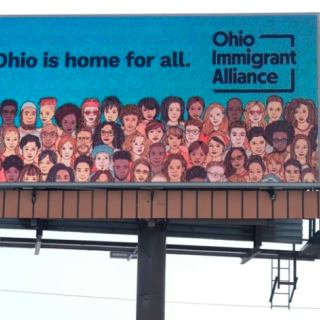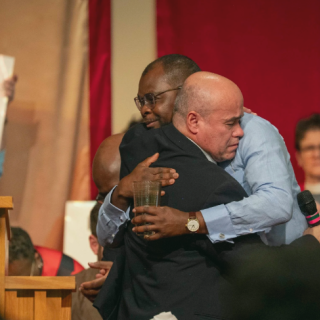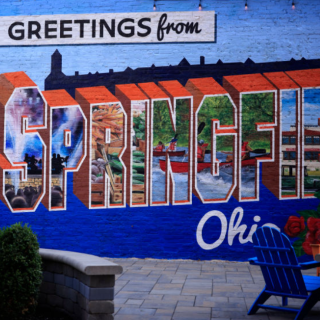Advertisement
Editor's Note: This Sunday the Hilltop Historical Society was scheduled to hold its annual memorial service for Confederate soldiers, but it has been postponed until September and a decision to place Confederate flags will be made then.
One year into America’s reported racial reckoning, it is difficult to discern much meaningful change in our country. A major factor contributing to our stalled progress is an inability to grapple honestly with our nation’s history. The recent American Legion incident in Hudson highlighted how much some people prefer anodyne, sanitized stories of an imagined past to thoughtful inquiry that honestly grapples with legacies of race and power. In Columbus, there are some who hold far stronger preferences for hagiography and mythology over history, with far starker implications and consequences.
Camp Chase Confederate Cemetery sits on Sullivant Avenue, on the west side of Columbus, one of a number of such cemeteries upon which the federal government spends millions to protect, alongside the more than forty million dollars of taxpayer funds lavished by our country upon Confederate monuments in the past decade. This Sunday, while the city prepares to brighten up the Hilltop with public art, members of the deceptively named Hilltop Historical Society will gather for a Memorial Service for Confederate soldiers.
While individual Confederate soldiers under disparate familial and financial circumstances may have had a variety of personal motivations and understandings for enlisting, these were men who were willing to die, to kill, and to be imprisoned for their commitment to destroy the Union and preserve slavery. They could have chosen to defect – as many Confederate soldiers did – but these men did not. Instead, they chose to fight for slavery and against our country.
On a very basic level, just as we do not celebrate Benedict Arnold, an accomplished officer under George Washington before deciding to aid the British, it is nonsensical to memorialize these men who rejected our country. To go so far as to decorate their graves with Confederate flags, as members of the Hilltop Historical Society have done in past years, is to celebrate their cause – the dissolution of the Union for the perpetuation ofslavery.
There are no legitimate historical questions regarding the fact that the Civil War was simply and solely about maintaining the institution of slavery. The achievements of revisionist “Lost Cause” propaganda have actively obscured and obfuscated suchobvious facts for many Americans. Indeed, the Federal Commission for Marking the Graves of Confederate Dead only came into existence to authorize the placement of headstones at Camp Chase during the first decade of the Twentieth Century, at the height of Lost Cause monumentalism.
The Confederacy was a regime of racial supremacy and terror, fighting for “states’rights” to preserve a “Southern way of life” built upon White supremacy. Following the Civil War and the failures of Reconstruction, the states of the former Confederacy re-enslaved African Americans through a system of racial superiority so successful ands evere as to serve as inspiration for the Nazis. In fact, it is telling that Confederate dead were memorialized during the same period in American history that more than 4,400 African Americans were lynched.
On the same website where the Hilltop Historical Society proclaims it “abhors racism,bigotry, and violence,” amidst photographs of gravestones decorated with Confederate flags, there is one photograph with a particularly revealing caption: “Our southernbrothers lay under a white cover of purity.” Despite its insistence otherwise, the Hilltop Historical Society cannot dissociate itself from the events that transpired in Charlottesville, because that very vision of racial purity is precisely the connective tissue between the Confederacy and contemporary White supremacist movements. (And, let us also remember that modern American policing emerged out of slave patrols and Jim Crow. So, when our same neighbors embrace both the surveillance state and a celebration of Confederate dead, can it really come as a surprise?)
With Juneteenth approaching, if members of the Hilltop Historical Society truly yearn to mourn and memorialize those “who just simply didn’t get to go home,” then why not remember and honor the tragic and resilient lives of enslaved Africans and their descendants, those who were brutally killed before, during, and after slavery. Millions perished during the Middle Passage and soon after landing on American shores. By the time of the Civil War, there were four million enslaved African Americans, meaning generations had been born and died in slavery. Thousands more Black Americans suffered and starved in Civil War refugee camps and in the immediate aftermath of the war, and 2,000 were killed in Reconstruction Era lynchings. Would it not be far more appropriate and meaningful to honor these lives rather than honoring precisely those who were willing to die for slavery and White supremacy?
If we are to truly face a racial reckoning in our country, and perhaps someday even a racial reconciliation, it will first be necessary for us to humbly confront the truth.



